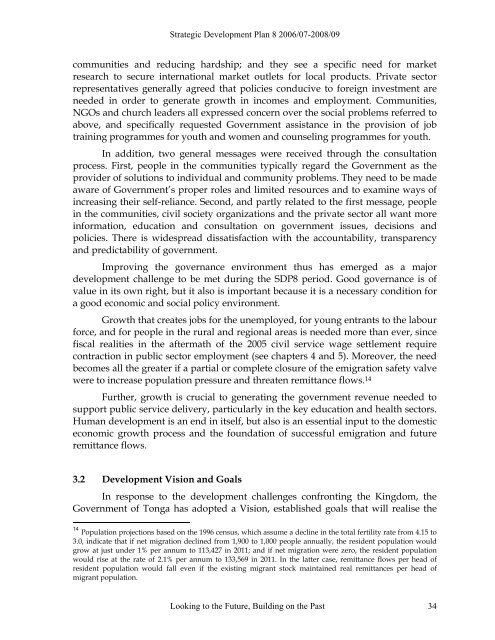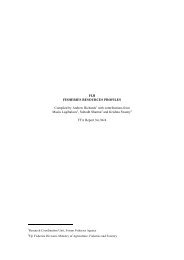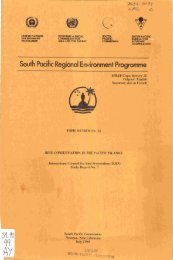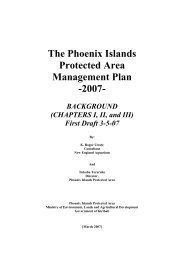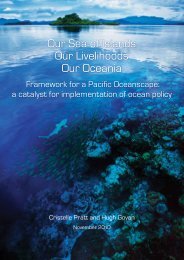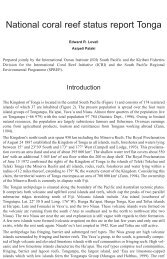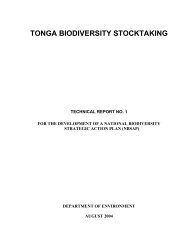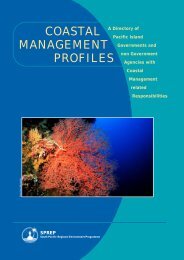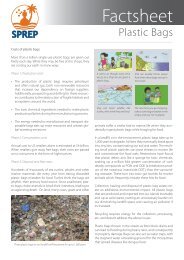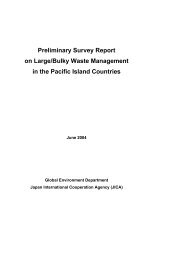KINGDOM OF TONGA - SPREP
KINGDOM OF TONGA - SPREP
KINGDOM OF TONGA - SPREP
You also want an ePaper? Increase the reach of your titles
YUMPU automatically turns print PDFs into web optimized ePapers that Google loves.
Strategic Development Plan 8 2006/07-2008/09<br />
communities and reducing hardship; and they see a specific need for market<br />
research to secure international market outlets for local products. Private sector<br />
representatives generally agreed that policies conducive to foreign investment are<br />
needed in order to generate growth in incomes and employment. Communities,<br />
NGOs and church leaders all expressed concern over the social problems referred to<br />
above, and specifically requested Government assistance in the provision of job<br />
training programmes for youth and women and counseling programmes for youth.<br />
In addition, two general messages were received through the consultation<br />
process. First, people in the communities typically regard the Government as the<br />
provider of solutions to individual and community problems. They need to be made<br />
aware of Government’s proper roles and limited resources and to examine ways of<br />
increasing their self-reliance. Second, and partly related to the first message, people<br />
in the communities, civil society organizations and the private sector all want more<br />
information, education and consultation on government issues, decisions and<br />
policies. There is widespread dissatisfaction with the accountability, transparency<br />
and predictability of government.<br />
Improving the governance environment thus has emerged as a major<br />
development challenge to be met during the SDP8 period. Good governance is of<br />
value in its own right, but it also is important because it is a necessary condition for<br />
a good economic and social policy environment.<br />
Growth that creates jobs for the unemployed, for young entrants to the labour<br />
force, and for people in the rural and regional areas is needed more than ever, since<br />
fiscal realities in the aftermath of the 2005 civil service wage settlement require<br />
contraction in public sector employment (see chapters 4 and 5). Moreover, the need<br />
becomes all the greater if a partial or complete closure of the emigration safety valve<br />
were to increase population pressure and threaten remittance flows. 14<br />
Further, growth is crucial to generating the government revenue needed to<br />
support public service delivery, particularly in the key education and health sectors.<br />
Human development is an end in itself, but also is an essential input to the domestic<br />
economic growth process and the foundation of successful emigration and future<br />
remittance flows.<br />
3.2 Development Vision and Goals<br />
In response to the development challenges confronting the Kingdom, the<br />
Government of Tonga has adopted a Vision, established goals that will realise the<br />
14 Population projections based on the 1996 census, which assume a decline in the total fertility rate from 4.15 to<br />
3.0, indicate that if net migration declined from 1,900 to 1,000 people annually, the resident population would<br />
grow at just under 1% per annum to 113,427 in 2011; and if net migration were zero, the resident population<br />
would rise at the rate of 2.1% per annum to 133,569 in 2011. In the latter case, remittance flows per head of<br />
resident population would fall even if the existing migrant stock maintained real remittances per head of<br />
migrant population.<br />
Looking to the Future, Building on the Past 34


